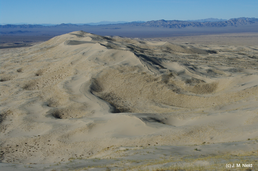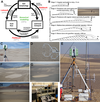Landscape evolution

Landscape evolution encompasses a wide range of simulated environments, from purely geomorphic systems, to biological systems or a combination of these. Importantly it examines how these systems change through time, with different environmental forcings.
For queries about this topic, contact Chris Hackney.
View the calendar of events relating to this topic.
Projects

Discrete ECogeomorphic Aeolian Landscape (DECAL) modelling
Joanna Nield (Investigator)
DECAL is a cellular automaton based model which incorporated mutual feedback processes between geomorphic forcing and ecological growth to investigate fundamental controls, self-organising and non-linear behaviour in semi-arid aeolian dune environments. This project explores landscape evolution and disturbance response, developing a phase-space in which dune fields can be quantified.
Impacts of Climate and Sea-Level Change on Coastal Gullies
Stephen Darby (Investigator), Chris Hackney, Julian Leyland
Content to follow
Mathematical modelling of plant nutrient uptake
Tiina Roose (Investigator)
In this project I will describe a model of plant water and nutrient uptake and how to translate this model and experimental data from the single root scale to the root branching structure scale.

Modelling the morphodynamic evolution of the Ganges-Brahmaputra-Meghna (GBM) Delta over centennial time scales
Stephen Darby (Investigator), Balaji Angamuthu
Around 0.5 Billion people live in deltaic environments where they are threatened by flooding and land loss frequently. Yet, our understanding of the threats posed by land dynamic process remains limited. In this work, we try to address this issue through a land dynamic simulation of the largest and most populated of all the deltas, the GBM Delta, using the CFD software Delft3D for a range of climate change and management scenarios. The results provide new insight into the factors controlling past morphodynamics that, in turn, are helpful when assessing the possible trajectories of future evolution.

Sediment Transfer and Erosion on Large Alluvial Rivers (STELAR-S2S)
Stephen Darby, Julian Leyland, Christopher Hackney (Investigators)
STELAR-S2S will provide the first comprehensive quantification of autogenic and climatic controls on riverine sediment fluxes for one of the world's largest rivers (the Mekong), leading to new generic understanding of the relationships between climatic variability, fluvial processes and sediment flux to deltaic zones and the ocean.

The application of automated pattern metrics to surface moisture influences on modelled dune field development
Robin Wilson, Joanna Nield (Investigators)
Areas of sand dunes (known as dunefields) develop complex patterns over time. These are influenced by both the past and present environmental conditions, including surface moisture, vegetation distribution and human impact. This project develops a method of automated pattern analysis which allow the patterns produced by a large number of sand dune evolution simulations (performed using the DECAL model) to be quantified over time.

The Origin of Aeolian Dunes (TOAD)
Joanna Nield (Investigator)
The overall aim of this project is to understand the genesis and subsequent evolution of aeolian early stage bedforms by quantifying for the very first time the role and importance of flow, transport and surface feedbacks in the initiation and emergence of dunes. This project offers the genuine prospect of surmounting arguably the major enduring research question within aeolian geomorphology, leading to broader insights which will offer knowledge benefits for sedimentary landform studies as a whole.
People
 Stephen Darby
Stephen DarbyProfessor, Geography (FSHS)
 Tiina Roose
Tiina RooseReader, Engineering Sciences (FEE)
 Julian Leyland
Julian LeylandSenior Lecturer, Geography (FSHS)
 Joanna Nield
Joanna NieldSenior Lecturer, Geography (FSHS)
 Christopher Hackney
Christopher HackneyResearch Fellow, Geography (FSHS)
 Rob Mills
Rob MillsResearch Fellow, Electronics and Computer Science (FPAS)
 Robin Wilson
Robin WilsonResearch Fellow, Geography (FSHS)
 Balaji Angamuthu
Balaji AngamuthuPostgraduate Research Student, Geography (FSHS)
 Leonidas Bourikas
Leonidas BourikasPostgraduate Research Student, Civil Engineering & the Environment (FEE)
 Chris Hackney
Chris HackneyPostgraduate Research Student, Geography (FSHS)
 Tom Hebbron
Tom HebbronPostgraduate Research Student, Electronics and Computer Science (FPAS)
 Ying Wang
Ying WangPostgraduate Research Student, Geography (FSHS)
 Petrina Butler
Petrina ButlerAdministrative Staff, Research and Innovation Services